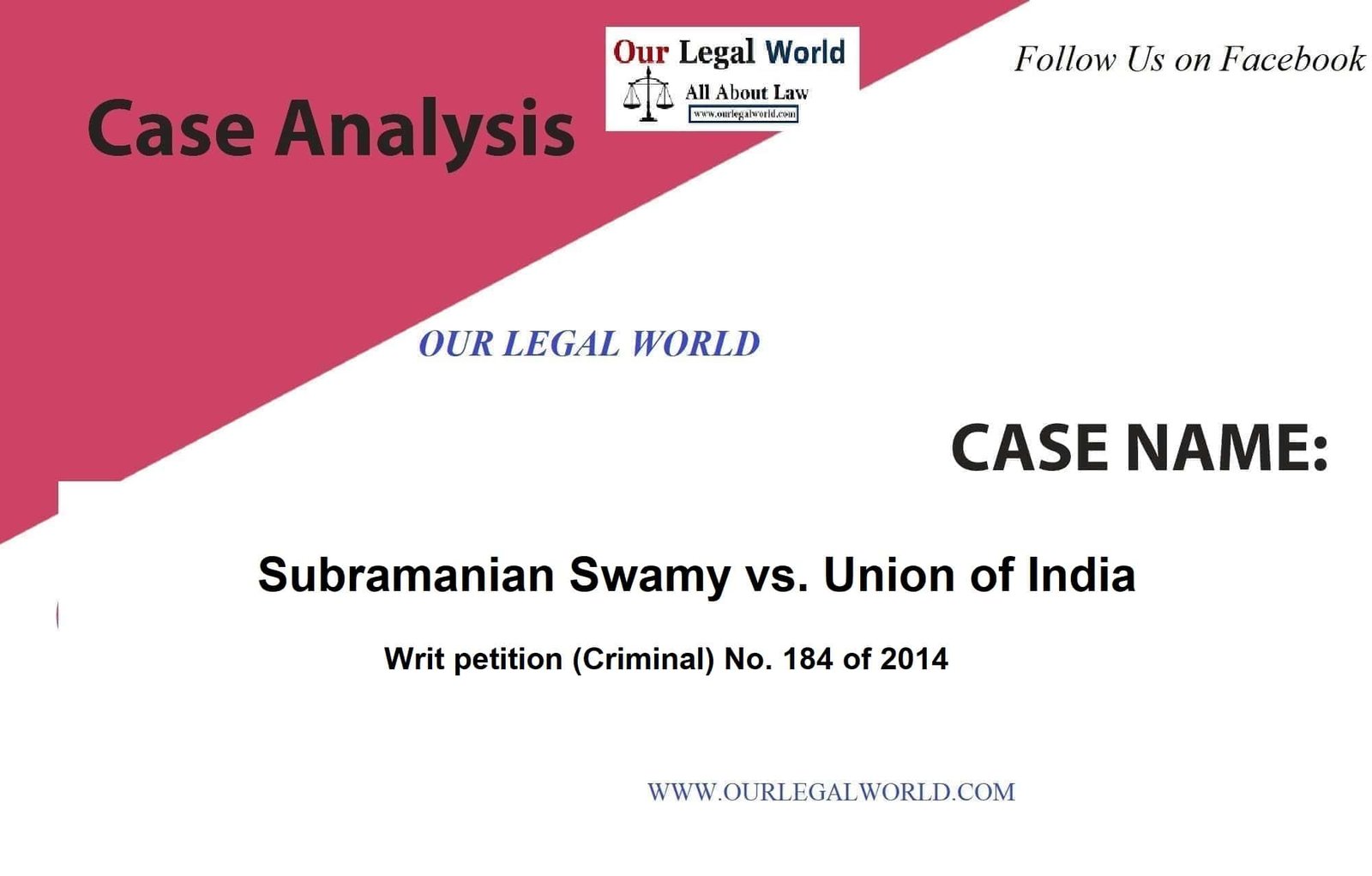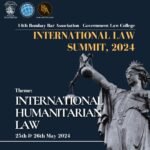Subramanian Swamy vs. Union of India: CASE ANALYSIS- Our Legal World
In the Supreme Court of India Criminal original jurisdiction Case No. Writ petition (Criminal) No. 184 of 2014 Petitioner Subramanian Swamy Respondent Union of India, Ministry if Law & ors. Date of Judgement Decided on Jan 21, 2014 Bench Justice Dipak Misra CJI and Justice Prafulla C. Pant
Introduction
Several politicians accused of criminal harassment under IPC Sec 499 lodge petition. They filed this Writ Petition before the Indian Supreme Court, claiming that CrPC’s Sec 499 and Sec 500 and Sec 199(1) and Sec 199(4) to be considered unconstitutional. The petitioners contended that Sec 499 and Sec 500 of IPC are violating the freedom of speech and expression that is essential and vital to a democracy. And that Article 19(2) can not be treated as a source of authority for Section 499 since the object of the Constitution is to safeguard the interests of the State and of the general public and not of any individual. The Court upheld the statutory validity of Sec 499 and Sec 500 of the IPC and Sec 199 of the CrPC after having studied in depth the definition of legitimacy, freedom of speech and expression, various international covenants, the status of law in foreign countries and the judgments of various Indian courts.
FACTS
Several of the politicians such as Subramanian Swamy, Rahul Gandhi and Arvind Kejriwal, who had been charged with criminal defamation under Sec 499, 500 of IPC, filed the Writ Petition. This petition deals with the statutory validity of Sections 499 and 500 of the Indian Penal Code, 1860 and the Code of Criminal Procedure, Sections 199(1), and 199(4), 1973. IPC Sec 499 allows for slander and Sec 500 for prosecution for the same offence. According to Sec 499,
“ Whoever, by words either spoken or intended to be read or by signs or by visible representations, makes or publishes any imputation concerning any person intending to harm, or knowing or having reason to believe that such imputation will harm, the reputation of such person is said to defame that person[1].”
The Court carefully studied both the scope and purpose of the rights and then recognized the need to reconcile the two freedoms. This decision explains very well the value of freedom of speech and expression but, at the same time, states that there is no limit to the same right and that no person should exercise that right to damage another’s reputation. Therefore it can be said that this decision would represent a strong precedent for any disputes that occur in the exercise of the public’s rights and freedoms.
The provision also includes ten exceptions in terms to which the act will not be deemed defamatory. Sec 500 states that anyone who defames another shall be imprisoned for a period which may extend to two years with simple imprisonment. CrPC Section 199 allows for defamatory proceedings. Sec 199(1) states that the Court shall only take notice of an offense punishable under Chapter XXI of the Indian Penal Code when a complaint is filed by the individual concerned. In the case of people under the age of 18, a fool, a lunatic, a person unable to make a statement about illness or infirmity, or a woman should not be required to appear in public; this rule does not apply. Sec 199(2) specifies that when an offense under Chapter XXI of the IPC is claimed to have been committed against an individual who is the President, Vice-President or Administrator of a Union Territory, etc.
Also Read: Remedy & Damages under Law of Torts:- Our Legal World
ISSUES
- Wheather Sec 499 of CrPC infringes freedom of speech and expression under Art 19(a) of the Constitution.
- Whether Sec 199(1) and 199(4) are violative Article 19(a) of the Constitution.
ARGUMENTS IN FAVOUR OF THE PETITIONERS
- Under Art 19(1), the right to uninhibited freedom of expression is essential to the preservation of parliamentary democracy. IPC Section 499 ex facie infringes freedom of expression and constitutes a severe infringement of the constitutional right under Art 19(1)(a).
- The power to impose fair restrictions pursuant to Art 19(2) is intended to safeguard the interest of the State and not any person. And thus, it can not be considered that Art 19(2) is a source of authority for Sec 499 IPC.
- A restriction that goes beyond the public interest criterion can not be viewed as a fair restriction and would be arbitrary.
- Art 19(2) is an exception to Art 19, and must, therefore, be read strictly and not liberally.
- An individual’s defamation is a legal error, for which the common law recourse is a damages lawsuit.
- According to Art 19(1), defamation of any person is unconnected to fundamental rights, and hence Sec 499 is beyond the scope of Art 19(2) 7. The right to one’s reputation, which is a facet of Art 12, is essentially applicable against the State, and therefore can not be invoked in Article 19(2).
- Crime is an offense against the society the State is the custodian of, defamation of any person by private individuals can not be regarded as a “crime” because it does not serve any public interest.
- The clause also goes so far as to talk of truth as an offense punishable by imprisonment and thus contradicts the revered principle as enshrined in Art 51-A(b), which is synonymous with the national war for independence.
- The accused’s obligation to show that his argument was for the public good is unwarranted and unfair since the words “public good” are very ambiguous.
- CrPC’s procedural provisions Sec 199 do not satisfy the reasonableness test as provided for in Art 19(2) of the Constitution.
ARGUMENTS IN FAVOUR OF RESPONDENTS
- Art 19(1)(a) is not an unbridled right to freedom of expression or to defamation as Art 19(2) is an integral part of the right to freedom of speech.
- The right to free speech pursuant to Art 19(1)(a) is itself conditioned/qualified by restrictions found in Art 19(2) which includes “defamation” as one of the restriction grounds and the word “defamation” must include criminal defamation, and there is nothing to indicate its exclusion.
- Contextual sense of the word “defamation;” and the grounds for derogations under Art. 19(2) reflects a public interest as its primary objective is to protect integrity as a common mutual value.
- The stance that Sec 499 positions private wrong at the level of public wrong is completely false, as slander or damage to reputation is an act intended to subserve simple polity harmony.
- In monetary terms, an injury to reputation can not be sufficiently compensated, and there is no reason for the fact that the same can be remedied by receiving an order from the civil Court.
- The rights enshrined in Art 19(1)(a) and Art 21 must be balanced, because the integrity of a person is an aspect of individual identity under Art 21 and can not be permitted to be tarnished in the name of the right to freedom of expression.
- Protecting integrity by resorting to civil law should not be a basis for making Sec 499 unconstitutional. Remedy for defamation under Civil Law and Criminal Law is a distinction and hence does not cause any inconvenience to any of the Constitutional provisions.
- It can not be permitted the importance of freedom of expression to have the composing effect on individual dignity, which is also an integral part of Art 21.
- The clause stood the test of time after the Constitution began, and the definition of “reputation” was not diminished but became an integral constituent of Art 21.
- The ten exceptions provide the law with fair protection, so it can never be said that the law suffers from lack of direction, thereby inviting the frown of Art 14 of the Constitution.
- The argument that the word “defamation” in Art 19(2) must be interpreted by applying the rule of noscitur a sociis since the word “defamation” is obviously not susceptible to analogous interpretation with the other grounds stated therein.
JUDGMENT.
The Court analyzes the meaning and interpretation of the words ‘defamation’ and ‘reputation’ in the judgment. The Court then discussed numerous international treaties stressing the importance of dignity and honor in a person’s life, including the Universal Declaration on Human Rights, 1948, the European Convention for the Protection of Human Rights and Fundamental Freedoms and, the International Covenant on Civil and Political Rights. The Court also states the legislation concerning reputation, freedom of expression and defamation in foreign countries, for example in the United Kingdom, the Court is of the opinion that ‘freedom of expression may be subject to such limitations as are required by legislation and are appropriate in a democratic society to protect others’ reputation.
The Court subsequently entered the Indian viewpoint of integrity and freedom of speech and then referred to the Port of Bombay v. Dilip Kumar Raghavendra Nath Nadkarn[2] and other case board of trustees. In this case, the Court held that “life” word does not merely connote animal nature or continued drudgery through life, it has a much broader sense, and that a person’s “reputation” is the finer graces of human society that make life worth living, and the same can only be jeopardized by legislation that inherits equal procedures. In Umesh Kumar v. Andhra Pradesh State[3], and another, the Court observed that the right to reputation includes personal human rights.
Another question that this Court considered was whether the asserted doctrine of noscitur a soccis should be extended to the word “incitement of an offense” used in Art. 19(2) in order to equate it with the phrase “defamation.” The Court held that there is no warrant to extend the principle of noscitur a sociis to give a narrow scope to the word “defamation” that it requires only criminal activity if it gives rise to incitement to constitute an offense. And the argument that slander can only get criminality if it incites to commit an offense is difficult to consider.
The Court also held that Section 499, which stipulates that another individual defames a private citizen, has no relation with Art 19(1)(a) of the Constitution, since Art 19(2) concerns the public interest and not that of an individual, and the provision can not, therefore, be the source of criminal defamation.
The Court also took note of the value of freedom of speech and expression in a democratic country, citing the Court’s judgment in many cases, including the case of Indian Express Newspapers, Union Of India v. Naveen Jindal & Anr[4].
The Court affirmed the constitutional validity of Sec 499 and 500 of the Indian Penal Code and Section 199 of the Code of Criminal Procedure in the light of the aforesaid review. The Court also held that, under Art 226 or Sec 482 of the CrPC, it would be open to the petitioners to contest the summons issued against them before the High Court.
CONCLUSION
Any democratic government’s most important role is to preserve the balance between the different rights which the public enjoys. If such a balance isn’t achieved, then the country’s whole economy will go into turmoil. This instant case poses a similar problem, with freedom of speech and expression and right to reputation being the two opposing freedoms. The Court has rather aptly struck a balance between these two freedoms through this judgment.
The Court carefully studied both the scope and purpose of the rights and then recognized the need to reconcile the two freedoms. This decision explains very well the value of freedom of speech and expression but, at the same time, states that there is no limit to the same right and that no person should exercise that right to damage another’s reputation. Therefore it can be said that this decision would represent a strong precedent for any disputes that occur in the exercise of the public’s rights and freedoms.
REFERENCE
- [1] IPC, ş 499.
- [2]1983 AIR 109.
- [3](2013) 10 SCC 591.
- [4]60 (1995) DLT 516.
- https://sflc.in/
- https://www.casemine.com/
- https;//ohrh.law.ox.ac.uk/
- http://Lawtimesjournal.com




![Call for Campus Ambassadors by Our Legal World [2 Months; Virtual]: Apply by June 15](https://www.ourlegalworld.com/wp-content/uploads/2024/06/Logo-New-136x150.png)


